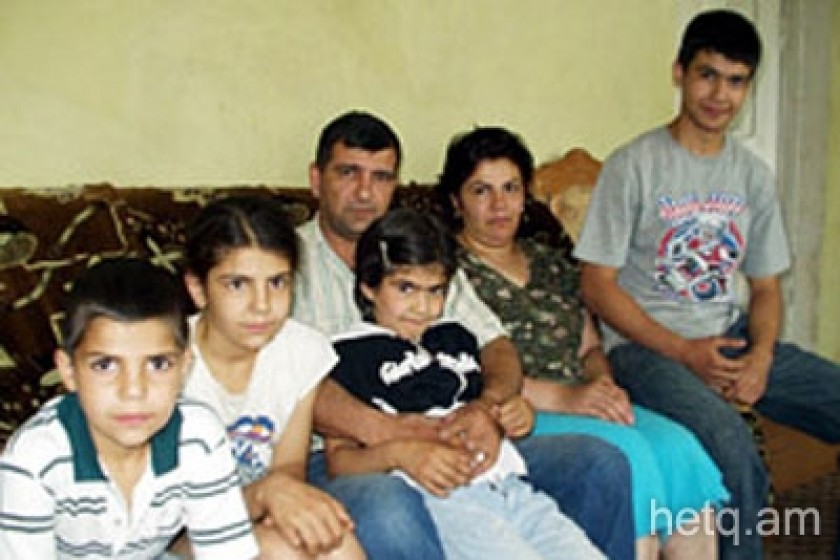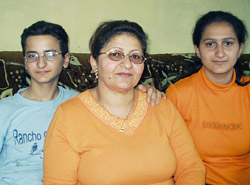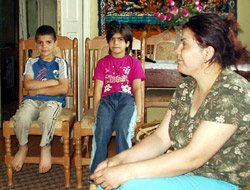
Iraqi Armenians are Disillusioned
Two years ago Barsegh Hambardzumyan and his family emigrated fromIraqtoArmenia.
They lived for a year and a half in Yerevan's Avan district, but paying $180 a month rent was a luxury the family couldn't afford, and so they moved to Echmiadzin, where they found a place for $50 a month. They have five children, all of them in school. Sixteen-year-old Masis frequently skips school because of the language barrier, and prefers to apprentice with his father, as an electrician. Ten-year-old twins Minas and Maral do their best to excel in school, and Alis and Moris, who are in middle school, are trying with difficulty to overcome the language barrier. They believe that one day they will be as fluent in Armenian as they are in Arabic.
Fifteen-year-old Aida Petrosyan, the daughter of Barsegh's sister, whose family also emigrated toArmeniafromIraqwith them, said what she liked here was the free and peaceful lifestyle. “There, it was forbidden to go out from six at night till eight in the morning. We couldn't even sleep. When the bombings would stop, we would call our relatives to find out if they were still alive, “ the girl recalled.
Her mother Arshaluys, who was visiting her brother's family, asked us to pass her complaints and condemnation along to the Armenian government, for completely ignoring Iraqi Armenians.
 “My brother's family of seven and my own family of four are barely surviving. It's good that my brother got a job at VivaCell with the help of the Red Cross. He is one of the few Iraqi Armenians who has gotten a job here, and that is only because of his five children, “ said Arshaluys Eghiazaryan.
“My brother's family of seven and my own family of four are barely surviving. It's good that my brother got a job at VivaCell with the help of the Red Cross. He is one of the few Iraqi Armenians who has gotten a job here, and that is only because of his five children, “ said Arshaluys Eghiazaryan.
Arshaluys explained that they and other Iraqi Armenian families living inArmeniasurvive on the money they received from selling their homes and land inIraq. “But that will run out one day. I've calculated, and we spent $1,000 in five months only for the rent and various taxes. Without a job, how are we going to live? I don't know, ” she said worriedly. She said that they had been to several job agencies, but were always rejected with the reply, “There aren't enough jobs for us, and now we have to worry about you…” She couldn't remember precisely which organizations gave that reply, but she does remember that atYerevan's 8 th Hospital she paid 6,000 drams for an X-ray, instead of 2,000. “That's how it is if you don't have a residency passport,” they told her.
Arshaluys is not happy with the school, either. “Every day they collect money. How can I pay them if none of us are working? But not paying is no good, either, since the children suffer.” Both Barsegh Hambardzumyan and Arshaluys Eghiazaryan are disillusioned byArmenia. “TheArmeniathat our parents talked about day and night did not lived up to our expectations. We feel ignored and uncared for here. We came here to our homeland, hoping that we would feel like somebody here, but believe me, we felt that way more inIraq. If it weren't for that damned war, we would never have leftIraq, “ said Arshaluys, who is relatively fluent in Armenian.
 Barsegh's wife Muna Hambardzumyan, who is Assyrian and understands only a few Armenian words, told us via her husband's sister that despite the fact that she became sick from the fear of bombs, she would happily go back, because at least in Iraq they didn't have problems with food. “ Once a month, the Iraqi government would distribute free flour, sugar, cooking oil and soap. Plus we had jobs. And here only the UN helps, and they give us so little food that it's not enough to last us till the end of the month, “ Muna said. According to her, the UN will continue supporting her because of her five children, but for people with smaller families, assistance will be given only once a year.
Barsegh's wife Muna Hambardzumyan, who is Assyrian and understands only a few Armenian words, told us via her husband's sister that despite the fact that she became sick from the fear of bombs, she would happily go back, because at least in Iraq they didn't have problems with food. “ Once a month, the Iraqi government would distribute free flour, sugar, cooking oil and soap. Plus we had jobs. And here only the UN helps, and they give us so little food that it's not enough to last us till the end of the month, “ Muna said. According to her, the UN will continue supporting her because of her five children, but for people with smaller families, assistance will be given only once a year.
Both families lived inBaghdad. Arshaluys Eghiazaryan was a manager in an energy company, with a good salary. She said that once when Saddam Hussein visited their office, everyone stood up “except me. He asked me if I knew who he was. I said yes. He said, ‘Why don't you stand up then?' I replied that my work would suffer. Saddam liked my reply. He ordered my bosses to give me 100,000 dinars as a reward for my courageous attitude and hard work, “ she recounted, and added that they all cried when they saw on TV how Saddam was hanged.
They are upset now, too, but for another reason—they want to go back. “A person dies once. If we have to die of hunger in our homeland, it would be better to die inIraqin an explosion, “ said Arshaluys. Her brother Barsegh, who after work receives rare orders to repair electric appliances, wants to go to Europe instead ofIraq.
“If we had money, we could go toSyria. We could buy a Shengen visa there and move toEurope. To find the details, I went to the UN office, where they told me that no one handles such issues, this is your homeland, you should stay here. It's true,Armeniais the best country in the world, but we can't live here, and also, people treat us like foreigners, “ Barsegh said.
 Videos
Videos Photos
Photos
Write a comment